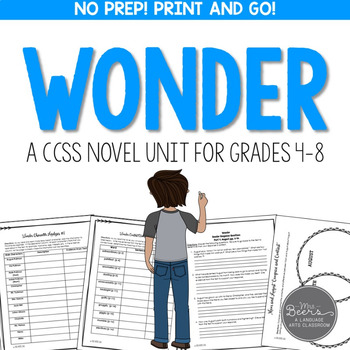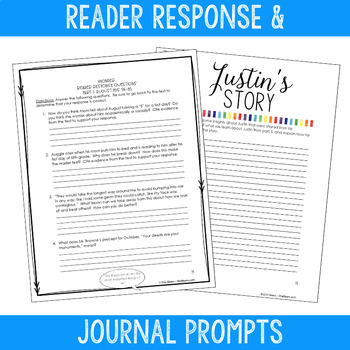Wonder by RJ Palacio Novel Study Unit
- Zip
What educators are saying
Description
Wonder by RJ Palacio is an outstanding book to read with your middle school ELA students!
This Wonder Novel Study Unit gives you all the lesson plans and comprehension activities you need to guide students through the story, and think more deeply about the characters, themes, and literary devices found within it.
Your students will be inspired by Auggie and all that he is able to accomplish despite the challenges of being different from his peers. Grab this common core aligned WONDER Novel Unit to accompany this amazing story!
Included in this Wonder Novel Study Unit Bundle:
• Reader Response Questions for Parts 1-8
• Lesson Plans for EASY implementation
• Character Analysis Work
• Context Clue Word Work
• Story Map
• Figurative Language
• Journal Prompts for End of Novel Reflection
• Story Retelling Activities based on the different narrators
• Compare and Contrast Work
• Sites to help students learn about Auggie
• Organization Tabs
• Book Review End of Novel Project
• Printable Quotes for Classroom Discussion and Display
• Character Analysis Project INCLUDED
• Answer Key
This resource is offered as a printable PDF download. Looking for a digital option? My Wonder Novel Unit for Google Slides features the same content but is formatted into Google slides...
• Wonder by RJ Palacio Novel Unit BUNDLE for Google Slides
Complete this unit as a whole class, small group, book club, or allow students to work independently. The included lesson plans and journal prompts give teachers multiple options to lead classroom discussions around the themes, settings, and characters in this novel. Check out this blog post for examples of how I teach the novel Wonder.
Novel not included, but FYI:
Interest Level
• Grades 4-8
Reading Level
• Grade level Equivalent: 5
• Lexile® Measure: 790L
• DRA: 50
• Guided Reading: U
Theme/Subject
• Adolescent Issues
• Middle School
• Living with Illness and Disabilities
• Pride and Self-Esteem
ELA Standards Covered:
RL.4.1, RL.4.3, RL.4.4, RL.4.5, RL.4.6
RL.5.1, RL.5.2, RL.5.3, RL.5.4, RL.5.5, RL.5.6
RL.6.1, RL.6.2, RL.6.3, RL.6.4, RL.6.5, RL.6.6
RL.7.1, RL.7.2, RL.7.3, RL.7.4, RL.7.5, RL.7.6
RL.8.1, RL.8.2, RL.8.3, RL.8.4, RL.8.5 ,RL.8.6
W.4.4, W.5.4, W.6.4, W.7.4, W.8.4
I would love to hear your thoughts on this novel unit. Leaving feedback also earns you points toward future purchases. Also be sure to FOLLOW ME so you are aware of new products as soon as they are posted!
*********************************************************************
More Bestsellers from Mrs. Beers Language Arts Classroom:
- Reader's Theater for BIG KIDS MEGA BUNDLE
- Editable ELA Word Wall for Middle School
- ELA Emergency Sub Plans Bundle Grades 4-8
- Context Clue Task Cards for Middle School
- Poetry Analysis Resource for Grades 4-8
*********************************************************************
Happy Reading!





